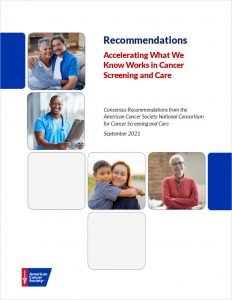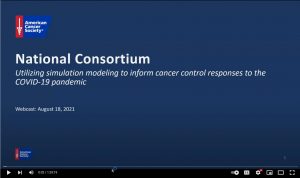The first phase of the American Cancer Society National Consortium for Cancer Screening and Care is to accelerate our responses to long-standing and emerging barriers to cancer screening and care. While the COVID-19 pandemic brings new challenges, the activities that prevent, detect, and control cancer do not require drastic change. Our most significant opportunity to recover from the pandemic exists through the acceleration of what we already know works.
Through the first Issue Hub and Summit meetings, the ACS National Consortium has built consensus on sensible next steps and provided actionable recommendations as the nation reprioritizes cancer screening. These recommendations will be critical to not only accelerate the recovery from the pandemic but also to accelerate the nation’s resilience and overall improvement in providing quality cancer screening and care for all.
Below you’ll find links to the recordings and reports from the Accelerate phase Issue Hub and Summit.

Summit #1: Recovering & Improving Cancer Screening & Care Throughout the Pandemic
On June 17, 2021, the ACS National Consortium hosted its first Summit to further consider the discussion of the first Issue Hub, build consensus on sensible next steps, and provide actionable recommendations as the nation reprioritizes cancer screening.
Accelerate Recommendations
The ACS National Consortium has collaborated to identify bold but sensible recommendations that aim to accelerate responses to longstanding and emerging barriers to cancer screening and care. If adopted widely, these recommendations will directly impact our immediate and long-term recovery from the pandemic. A final comprehensive report with both the Accelerate and Strengthen recommendations will be published in early 2022.
Utilizing Simulation Modeling to Inform Cancer Control Responses to the COVID-19 Pandemic
On August 18, 2021, the ACS National Consortium brought together leading researchers of the National Cancer Institute’s Cancer Intervention and Surveillance Modeling Network (CISNET) to discuss what the latest simulation models tell us about near and long-term effects of the COVID-19 pandemic on colorectal, cervical, and breast cancer outcomes. The panelists also explored how to utilize modeling research to improve strategies aimed at recovering from pandemic-related disruptions to cancer screening as well as tackle pressing issues in health equity and cancer disparities.



